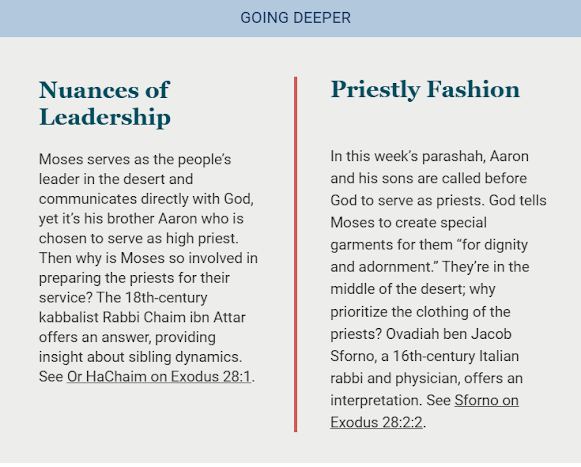Parashah Study Companion
I found this in my inbox this morning, so I thought I might as well have a look-see. I am glad I did!
Tetzaveh (meaning “you shall command”) opens as God instructs Moses to appoint Aaron and his sons as priests. God then goes into detail about how to make priestly clothing and sanctify the priests. This portion also explains the procedures for offering sacrifices and building a special golden altar. Because it’s also Shabbat Zachor (Sabbath of Rememberance), there’s a special maftir, or concluding reading (Deuteronomy 25:17-19), to remember what the Amalekites did to the people of Israel when they traveled in the desert.
When I clicked on the link to Or HaChaim on Exodus 28:1 (under the heading Nuances of Leadership, above), I was quite amazed at these 2 paragraphs, which I will quote below:
Quote: "And you shall bring near to you your brother Aaron, etc." We must understand the words: "and you- bring near- to you," in light of the statement in Shemot Rabbah 3,17 according to which it was G'd's original plan to appoint Moses as High Priest. This was changed due to Moses' repeated refusal to accept the role assigned to him by G'd which angered G'd. As a result (Exodus 4,14), G'd told Moses that his brother Aaron who had merely been a Levite up to that point, had now been promoted to be a High Priest. When G'd commanded Moses at this point to perform the ceremonies required for Aaron to assume the office of High Priest, He told Moses that he had to make his own contribution to this ceremony so that he would not be perceived as begrudging Aaron an office which had originally been intended for him. In fact, the appointment of Aaron to this position would serve as atonement for Moses who had resisted G'd's invitation to become leader of the Jewish people at that time.
The point mentioned last may be better understood in light of our tradition (Kabbalah) that when man opposes G'd, one of the many branches of his soul becomes detached from its holy root. At the time when Moses raised repeated objections to G'd's demand to accept the mantle of leadership, one of the branches of Moses' soul became detached from its celestial root. Although Moses had been punished for this, he had not obtained atonement until Aaron was inducted into the office of High Priest. Moses' active participation in this procedure would accelerate his atonement for this mistake. When the Torah speaks of ואתה הקרב אליך, we may understand this in the sense of "And you shall bring the estranged part of your soul close to you." G'd informed Moses that appointing Aaron would be his תקון, his rehabilitation for the error committed when he said to G'd: "send the one You are in the habit of sending (Exodus 4,13)." Unquote.
I hope some of you will have the time to read through these words, as I find them valuable for us in our lives today, as we make our way through these treacherous last days. We need all the help we can get from HaShem.
I also just want to mention that this is the 2nd year running that at the strike of Adar, my joy goes out the window and I am beset by all manner of disasters. A reminder to myself as well as yourself is that Adar is the darkest month of the year and our Lights need to shine more brightly than at any other time during God's year. Let us remember WHO is on The Throne and that He is our Father and our King.
As we say in South Africa, Sterkte!
In Hebrew, that would be חַזָק!




Thanks for this Penny. It is an interesting read. Love T
ReplyDeleteThanks T. I thought so too:)
DeleteAppreciate this Penny. This world is so troubled a place, but yes, HaShem is on The Throne. For this we know, so to love and not to be fearful. Blessings.
ReplyDeleteTodah. Indeed, the world is falling apart. We remain firm in our faith in Him.:)
Delete